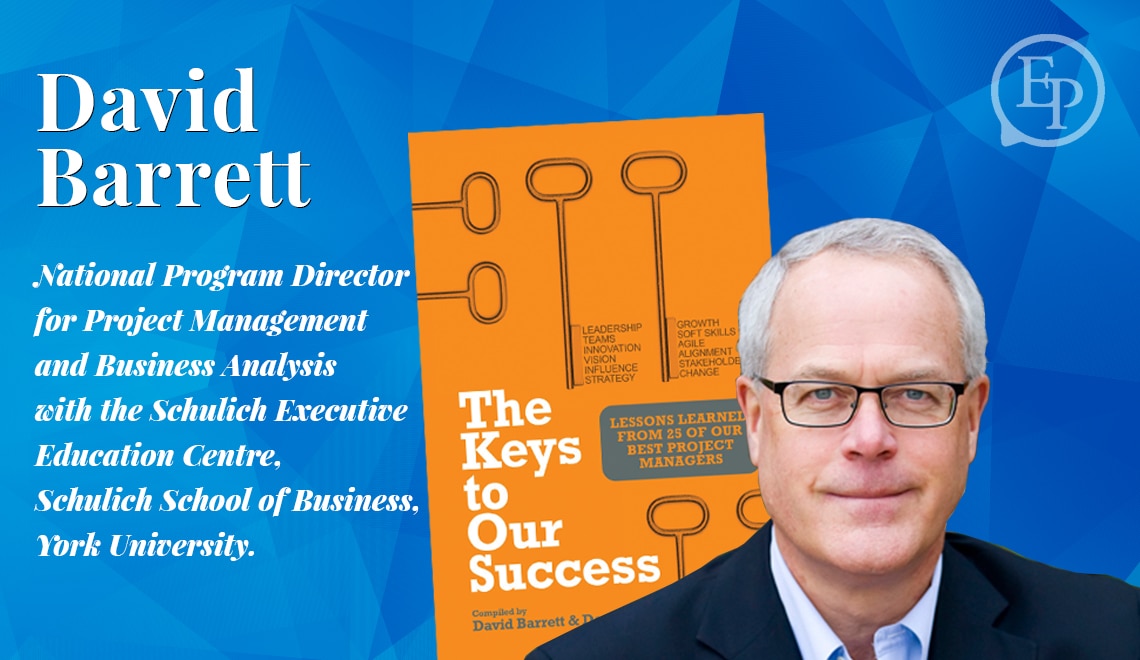In addition to his position as the National Program Director for Project Management and Business Analysis, David has published four books and is a regular blogger, podcaster and professional speaker specializing in leadership, strategy execution and professional growth.
Your book, The Keys to Our Success, is about project management. What inspired you to write a book on that subject?
I have been in the project management business for call it twenty-five years, and my specialty is creating communities of people where we can learn and grow with each other: I built a web portal, and I built a whole series of conferences for a number of years; I had a magazine. All these things allowed people to write and read, speak and listen.
I guess over time as things evolved, the idea of a book came along. We keep thinking of the modern ways of growing communities through social media and other things, but it’s kind of funny when the clouds parted and I said, “Let’s go back and talk about a book.” People still read books, whether it’s an e-book or physical. Many people prefer to hold something in their hands.
The concept was to put a book together, but my issue is that reading one book about one idea from one person is brilliant if the person is really brilliant. I have never claimed to be brilliant, but I know a lot of brilliant people. It dawned on me that I really did not have to write the whole thing myself, and maybe I could get my friends to help. It’s just like putting together a conference: You get twenty-five speakers together and have a conference? Well maybe we could get twenty-five people together and have a book.
How did you identify and select the project managers and leaders that you wanted to feature in the book?
I believe I reached out to seventy or eighty people hoping we would end up with about twenty-five contributors. I didn’t want to waste people’s time. I didn’t want to say, “Write it, and I’ll approve it,” as I thought that would be rude. Instead I asked them to give me a quick three hundred-word synopsis of what you would want to write to the question, “What is the key nugget, the key thing or idea that you take into every one of your projects or initiatives that you believe gives you the best chance for success?“
We had an idea of the areas that we wanted the book to cover, and so as responses started to come in we realized that we were going to have to make some big decisions on the general leadership area and the technical management area, but we were a little light in these three areas and maybe completely void in these two, so what are we going to do? It was an interesting process that we went through to get the content.
Advice can often be very context specific. How did you engage with these people to share their ideas and insights in a way that would make sense to a broad audience who is not actually asking the question but is coming to this book hoping to be inspired?
A lot of people said to me, “I need a lot more than two thousand words, because I want to tell you how to manage projects.” And I would have to say, “No, no. We definitely don’t want you to do that. There are whole books dedicated to how to manage projects. What I want you to do is narrow every engagement down to that one consistent piece that you bring into everything you do.”
And that really gave some people trouble, as it constrained them to only think about one piece. “Gee, I can only pick one?” The challenge I had was keeping their focus down on that one idea, but once they got it –you know, we might go through two or three drafts as you would with any author—but they wrote it in a way that really came together well.
I love the idea that it is a collaboratively written book between a number of people. I notice on the byline you had a writing partner yourself. Can you tell us a little about how you and Derek Vigar worked together on this project?
I had the idea, but I also knew where my constraints were: I was so busy; I was trying to do way too many things at one time, as I always do; so I needed someone who was willing to take this on with me, to leverage my connections to help collect the content and do a lot of the groundwork as we went through it. We both had knowledge of the business: I had the connections, and he had the time to help bring it all together. It worked out very well for both of us.
How does this book tie into some of the other work you do throughout the year?
I am primarily a professional speaker in the project leadership, corporate leadership, and project management space, so all of this feeds to my engagements. I can relate and tell stories and build the ideas around what some of these great people have experienced. They aren’t telling any great secrets, but it is wonderful to reference some of the work that they have done. It expands my experiences through twenty-five other people.
I have one speech that I do for corporations where we highlight seven chapters that focus on ideas where I believe we can make a difference tomorrow, and each of those pieces includes a video from the author where they can say, “This is what I was trying to say, and this is the key nugget of my chapter.” We then typically have a very interactive discussion with the audience about what we’ve heard, how we would apply it, how it would work, and maybe some of the risk about working with this kind of idea.
I certainly refer to the book a lot, both in my speeches and in my blog posts. I blog once a week, and I often refer to this book and to my other books as well.
Let’s talk further about the book’s purpose. What are you hoping readers will take away from this book? What is the thesis?
I think any time in life we are all trying to be unique and different and stand out from the crowd. In order to do that you have to either look different, work different, commit to something that is outside the box, look for the white space, do something unique. A book likes this gives project managers and project leaders an opportunity to see that difference from twenty-five really great professionals with great experience.
If they can pick up one, two or even three or four of these key ideas and give their next project the piece it needs to be driven to success maybe a little earlier or a little under budget, or at least on time and on scope and on budget like we wish as project managers, than that’s why the book is there. Give me something that can make me better tomorrow, and that’s what we’re all trying to do. In all twenty-five chapters, there is something there for everyone where they can stand up and be counted.
– – –
Summary of The Keys to Our Success Complied by David Barrett & Derek Vigar
What are the keys to success in project management? We sought out twenty-five of our leading project managers to find out.
What we continually see from conferences, industry events, and post-secondary classrooms is keen interest from those in the project management profession to connect with and learn from the best. So, we approached those widely regarded as industry leaders and asked them a straightforward question: “What is the best piece of advice you would share for success in project management?
The result is this book—a collection of their best stories, lessons, and takeaways. twenty-five different industry leaders make twenty-five different compelling cases for why their “key” will help influence your project success:
- The seven bullets of highly effective project managers
- Why leadership must be taken, not given
- The importance of becoming project “business-savvy”
- Ways to generate meaningful client ownership
- How great project managers make it fun
- And 20 other differentiators that have helped these industry leaders stand out.
If you’re interested in what’s really important to differentiate yourself and take the next step in your project management career, then this book is a fantastic opportunity to connect with trusted mentors, read honest advice from people who have been there, and start to incorporate these keys to success into your own practice.














